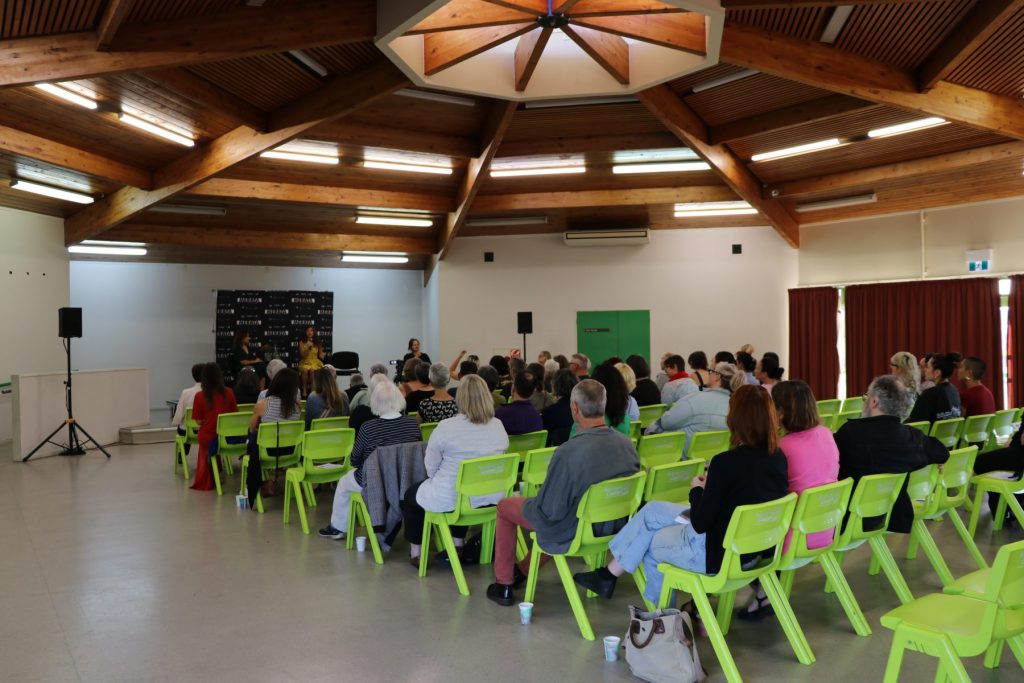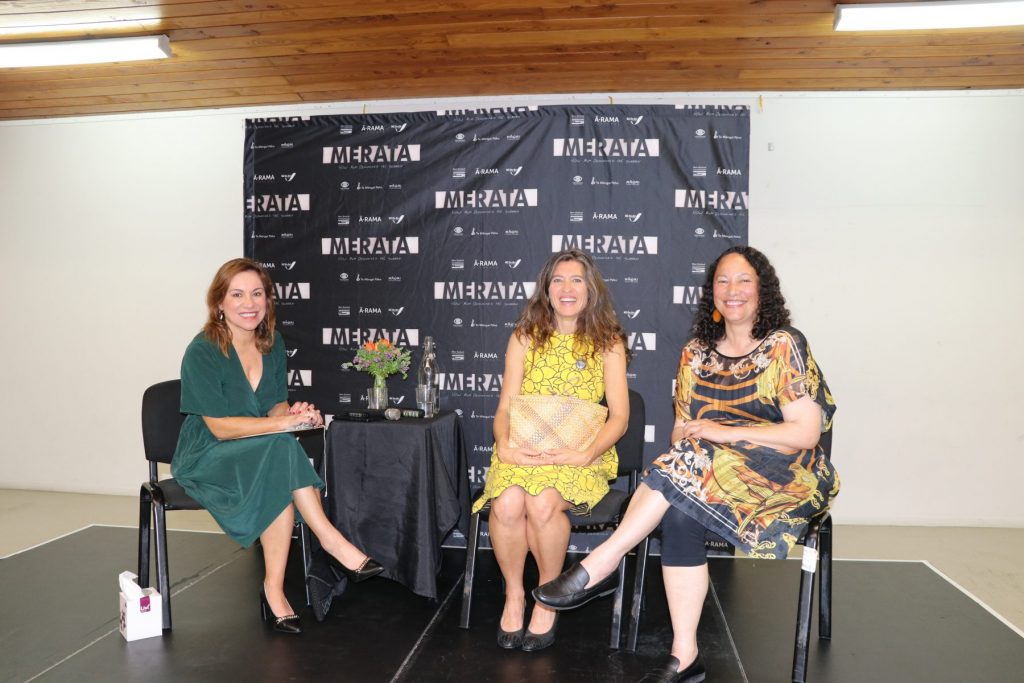Chelsea Winstanley: Life is a Series of Soul Collisions
The director and Oscar©-nominated producer talks hīkoi, heroes and Hollywood
On a lovely Spring evening, we witnessed a warm chat among friends at Western Springs Garden Community Hall: it turns out Chelsea Winstanley (Ngāti Ranginui, Ngāi Te Rangi) and Stacey Morrison (Ngāi Tahu, Te Arawa) have got to know each other through their daughters. And later on, they were joined by another special guest Awatea Mita (Ngāti Porou, Ngāti Pikiao) – more on that in the section on Awatea’s Mum Merata Mita below.
But first – Chelsea and Stacey discussed the mid-November hīkoi for tino rangatiratanga and against the ongoing government attacks on te Tiriti o Waitangi. For Chelsea, the government’s motivations for the Treaty Principles Bill, the Fast Track Bill and removal of references to the Treaty in dozens of pieces of legislation include “corporate greed”: “If we take a look at what they’re trying to do, it’s going to affect us all – all of our mokopuna, all of our whānau, everybody in this room tonight.”
Chelsea walked over the Auckland Harbour Bridge with her daughters who broke out into waiata with their kapa haka group. “That was so beautiful… it was so cool, this group of just fierce little kōtiro Māori just going for it over the bridge, that was amazing!” Then she went down to Pōneke for the last day of the hīkoi: “When I saw Hana[-Rāwhiti Maipi-Clarke] tear up that Treaty Principles Bill in Parliament I was like ‘get online and get a ticket immediately – we got to fly down to Wellington!’”
Chelsea described the hīkoi as a heartening action of unity, filling her wairua. “The whole thing really felt like we as a nation of Māori, of tangata whenua, of tangata tiriti, were coming together for the common good…. a nation of people who live here together: we can do this together, we can change things together. I think the power of the people really was the most impactful statement on that day – all colours, all creeds, all people [were there]. [It felt like] hope that we are powerful in numbers and – as much as they want to divide us up – they can’t, coz look at this! we’re just continuing to grow and continuing to want to work together.”
Hollywood, e hoa: “We got Elton John over the line!”
Chelsea is co-producer of not one, not two, but six Disney animations in te reo Māori. The most recent is Moana 2 Reo Maori which – on the very day Chelsea spoke with us – made history by opening simultaneously with the English-language version.
“We reimagine these films so they’ll make sense for our babies,” Chelsea explained. As always, language is about culture – you can’t separate the two. “So they’re not watching a literal word-for-word translation, instead they’re watching a world that’s reimagined for them.” For example, in te reo Māori, a grieving son in The Lion King refers to Matariki. Chelsea: “As a nation, we’ve all experienced the beauty of Matariki and what it means to set our beautiful souls – that have passed on – into the night sky. And so all those little beautiful messages are put into that script for our babies to be able to go, ‘oh! That’s me, that’s my life. I understand that – that’s normal’.”
Another example – which Stacey as Kāi Tahu particularly appreciates – is in Frozen, which uses Kāi Tahu’s mita (dialect). (As Chelsea put it: “why would we use a coastal dialect that doesn’t have snow? No, really, we got to go down south!”) Instead of singing “the cold never bothered me anyway”, Elsa sings a Kāi Tahu affirmation: “Aoraki matatū ake nei!” Stacey remembers the whole cinema erupting into cheers in response.

Who got Disney to see reo speakers as an audience worth wooing? Stacey suggested Chelsea’s superpower was getting past gatekeepers, into rooms to talk to powerful people. Chelsea countered it was also that she was good at spinning stories (not that she put it quite so politely!) When Chelsea went to pitch a reo version (of the first Moana) to Disney executives – pre Jojo Rabbit (the film Chelsea was Oscar-nominated for, as producer) – she describes herself as “super green”. But that was not necessarily a bad thing: “Being a bit naive in those spaces – it’s quite endearing probably.” She told the execs she and translator/co-producer Tweedie Waititi and the team had the money to do the project… and then they arranged the money – afterwards.
Another coup: “We got Elton John over the line.” No other language – not French, German, Spanish or any other – was allowed to remove Elton John’s English version of “Can You Feel the Love Tonight” over The Lion King end credits. When Disney told them it was impossible, Chelsea says: “We were like ‘what?! We can’t have this incredible movie be in reo Māori all the way through and then have that massive big ballad in English, it’ll be weird!’” but the executives just said sorry, Elton has it locked down. So the team turned that “no” into “an opportunity for a yes!” Chelsea and her co-producers found Elton themselves and in a “beautiful little video” made with various mates “throughout the world”, asked him “really just from our heart”: “‘you don’t know what this means to us and for our children and for our country and for our future – can you please consider? And we just were really honest about what it would mean.”
The yes from Elton John came just in the nick of time. Disney couldn’t believe it. “But I think it’s just part of – just keep dreaming!” says Chelsea. “Don’t take no as a given, just keep going. If you have it in your guts… the intention has always been pure with these projects, and I just think there’s other forces working out there to make it happen.”
And yes, there are showings of Moana 2 Reo Māori with subtitles in English – Chelsea would like everybody to see it: “What’s good for Māori is good for everybody!”
The tamariki are the film’s sharpest critics. “They now have the audacity to take it for granted – which is actually the win,” commented Stacey. “I didn’t even know I’d see in my lifetime – but yet it’s totally normal for them… They just wonder why we’re so weird about it, so emotional.”
Chelsea agreed. “Our dream was to have our babies walk into the cinema and chose the film and the language. That dream is complete!”
(For more stories about bringing Moana 2 Reo Maori to life, see Chelsea’s Nov 2024 interview with The Spinoff)
Merata, the Godmother of Indigenous Cinema
“I wanted to make documentaries because I saw Bastion Point Day 507, and I was like who was brave enough to make this film?… who would have the audacity and guts to do it?” said Chelsea. The answer as to who covered the Crown’s eviction of Ngati Whatua from their ancestral land in 1978: groundbreaking filmmaker Merata Mita (Ngāti Pikiao, Ngāi Te Rangi, 1942-2010). “I was blown away,” recalls Chelsea. “And I thought if a Māori woman could do that then maybe I could do it too.”

Merata also made Patu! (1983) about the Springbok Tour clashes, and Mauri (1988), the first dramatic feature film solely written and directed by a woman in Aotearoa New Zealand, and by an indigenous woman worldwide. Merata’s influence – as an indigenous woman making films for indigenous audiences – was global, and is still felt today. “She was so intrinsic to ensuring that indigenous filmmakers around the world had connections,” said Chelsea, who credits Merata for being an “anchor point” for Māori in Hollywood and enabling indigenous filmmakers to feel they deserved to be at top film festivals such as Sundance.
In 2018, Chelsea produced a documentary about her hero: Merata: How Mum Decolonised the Screen, made by Merata’s son Heperi Mita. So it was particularly special at our kōrero evening that Awatea Mita – AWC’s Women’s Services Coordinator, Merata’s daughter and Chelsea’s friend – joined Chelsea and Stacey onstage. Awatea noted that her mother is known as “the godmother of indigenous cinema”: “[her] legacy I see in Chelsea’s work. Not only has she upheld that legacy but she’s promoted it even further…. I’m really proud to sit here with Chels today.”
Chelsea returned a mihi to Awatea, saying it was an “honour to be in your presence to know you through your mum and then beyond – and to witness your rise into greatness… I know what you’ve been through and I’m so proud of you and I’m think about your mum often and how much she is just loving on you.” (To catch a glimpse of Awatea’s awesomeness, see her AWC profile).
Awatea is interviewed in How Mum Decolonised the Screen, and travelled with the film to Venice and Germany: “My brother and I had to start to divide up the festivals!” Merata the film was picked up for distribution by “incredible” BAFTA-winning African-American director Ava DuVernay. Chelsea recalled that Ava’s second-in-command watched the film first: “She immediately called me back and she said ‘oh my God, everything that Merata says and talks about is exactly what comes out of Ava’s mouth!” Chelsea is proud of the distribution “coup” that meant Merata’s story was not going to languish in a distributor’s catalogue but “was going to be cared for” – it went on to be shown on Netflix and in aeroplanes across America. At the theatre opening of the film in America, Chelsea recalls Ava getting up and saying “everybody should see this movie!… everybody must know who Merata is!” Merata’s story went on to be shown on Netflix and in aeroplanes across America. (Merata: How Mum Decolonised the Screen is currently streaming for free on Māori Television).
As for Chelsea herself, she turned to Awatea at our kōrero, and made it clear: “I’m only here because of your mum, I only do what I do because of your mum.”
Life advice from Chelsea Winstanley
- “Don’t be afraid to reach out to people – what are you going to get, a ‘no’? You don’t know unless you ask! Often people are quite open.”
- “Life is a series of soul collisions … and every soul collision is an opportunity learn… every soul collision has a meaning and a purpose in your life.”
- “This too shall pass … the good and the bad – it too will pass, and you’ll get through it.”
Then Chelsea noted “I’m having soul collisions right now!” and garlanded her two friends Stacey and Awatea with necklaces she’d brought along in a kete given to her by Merata’s children, and there was applause – and more than a few tears – to bring the beautiful evening to a close.
